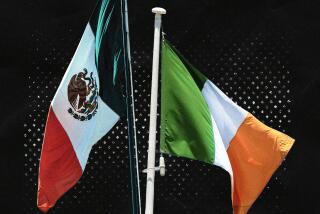Russia’s ‘Great Patriotic War’
- Share via
This is with reference to Prof. Steven F. Cohen’s essay (Editorial Pages, Jan. 21), “World War II, Goes On for Soviets.”
Cohen’s article failed to note the great lengths to which the Soviet regime goes to keep alive memories of the “Great Patriotic War” and to use the war as a metaphor for its perception of global politics.
On a recent visit to the U.S.S.R. we noted the many memorials and museums dedicated to the war. These museums are elaborate and are designed not just to teach the younger generations the heroism and suffering that Russians exhibited and suffered during the war, but to teach them about the evils of the non-Communist world.
When visiting one of these museums one is first struck by the graphic detail in which the horrors of fascism are demonstrated to even young children: life-size dioramas abound; huge photo murals demonstrate the atrocities of concentration camps; heroic deeds of the Communist liberators and victors are celebrated. The visitor from the West wonders why it is so necessary to keep these memories so very alive until he realizes the absence of a great deal of information in these elaborate displays: the museums do not give a hint that the U.S.S.R. had allies in the war; captured arms are identified, for example, as being of “English” or “Belgian” origin, implying that these nations were as much a part of the U.S.S.R.’s enemies as Germany. There is no reference to Germany as such; references are to fascism on the one hand and communism on the other as if these were the only alternatives available. There is no hint that a Jew may have perished in the graphically depicted concentration camps; the visitor is left with the impression that concentration camps and other atrocities were solely directed at the “patriotic by definition” Communists.
The “Great Patriotic War,” which the U.S.S.R. celebrates and uses to educate its young, is a parable. It is largely a myth used to impress communism’s children with the fact that communism is heroic and life-saving, while the alternative is fascism, concentration camps, torture, death and everything evil.
It is, therefore, not just the “war’s legacy,” which, as noted by Cohen, “underlies the deeply ambivalent Soviet attitude toward the United States.” It is the uses to which this part of Soviet history has been put, which, in equating the entire West with fascism, undoubtedly colors Soviet attitudes toward the United States.
W.F. RYLAARSDAM
Los Angeles
Cohen presented a reminiscence of the Soviet Union’s struggle in the second World War with apologies for Soviet policies and ending with the admonition, “Americans . . . should consider the Soviet reaction to our lessons of that war. None are more offensive than the argument that the Soviet Union is a latter-day replica of Nazi Germany and that serious negotiation are Munich-like acts of appeasement . . .”
As an unenlightened American, I agree completely. The Soviet Union is far worse than any evil created by Hitler. The gulag prisons and camps have destroyed over 10 times as many people as the Nazi concentration camps. Furthermore, nearly an equal number died in addition either from systematic starvation through famines or as targets for the Wehrmacht as a policy of extermination of “enemies of the people” throughout the Communists’ bloody history.
However, we are informed that the costs were worth preserving Stalin’s regime. Victory brought power and this was “so popular . . . that even embittered Russians often forgot or forgave the misdeeds that had contributed to the catastrophe of 1941.” Who was asked?
Hitler, whose hatred of Slavic races is well known, had at his disposal an army of a million Soviet prisoners of war willing to fight their countrymen. “The system . . . became a truly national one and thus legitimate.” Tell that to the Finns, Poles, Hungarians, etc. or even the Estonians and Ukrainians among others.
No one should question the sacrifices made by the Soviet people on behalf of the “Great Patriotic War,” but that does not legitimize a militarily expansionistic empire. Was the price worth the cost to the Soviet people? Ask the refugees from behind the Iron Curtain. After all, they paid the price and reaped the “rewards”--and live to tell about them.
The Eastern Establishment liberals have lost their credibility to lecture on America’s foreign policy. Perhaps they should consider getting their candy-posteriors out of their armchairs and suggest ways to contain this inhumane slave society from encroaching ourselves and our allies, instead of demanding dialogue and empathy with the missile-rattling Mafia in Moscow.
GERHARD THIELMAN
Woodland Hills
Cohen’s article does not mention the American Persian Gulf Command. For 24 hours a day American and Russian convoys took war supplies from the Persian Gulf to the Russian border.
Also, the railway from Avwaz to Tehran was manned by American railway engineers carring war supplies to Russia. Also the Americans had an air base at Abadan, which supplies planes to Russia.
Without these supplies Russia could never have won the Battle of Stalingrad. This was well known at the time. Germany had completely overrun Russia, destroying nearly all her munition plants.
A whole history can and should be written on how America saved Russia by forming the Persian Gulf command. There was no road from the Persian Gulf to the Russia border. The Army Corps of Engineers built a road on which the Russian and American convoys traveled 24 hours a day
Apparently Russia finds it very convenient to forget; she owes her very existence today to the United States.
HENRY REEVES
Laguna Hills
More to Read
The biggest entertainment stories
Get our big stories about Hollywood, film, television, music, arts, culture and more right in your inbox as soon as they publish.
You may occasionally receive promotional content from the Los Angeles Times.










